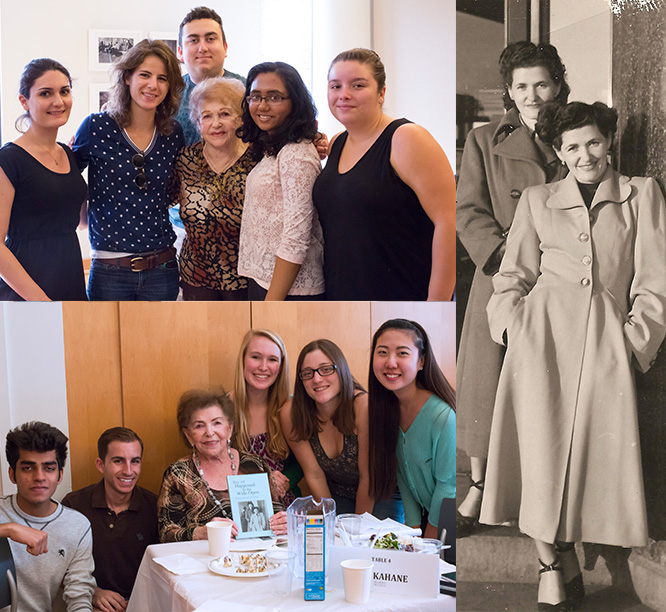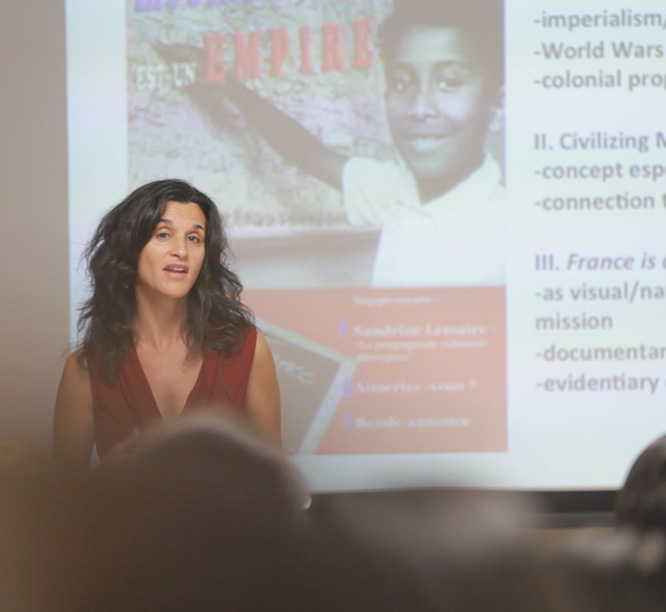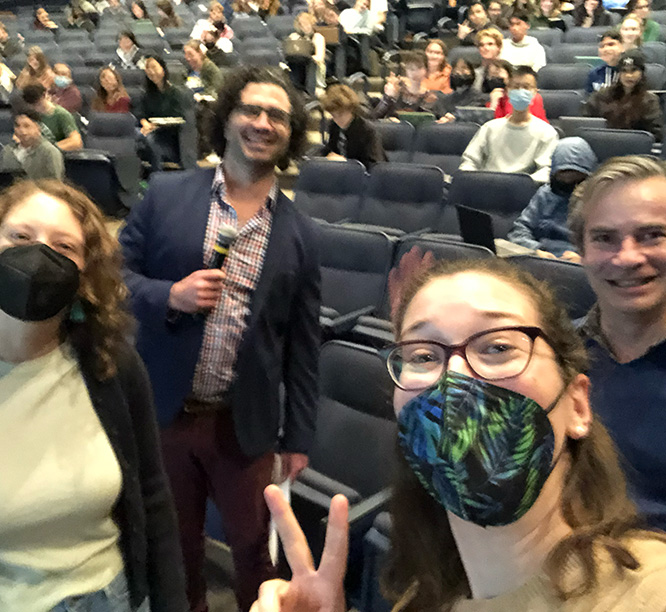


The UCLA Alan D. Leve Center for Jewish Studies faculty affiliates offer a wide range of courses in the field of Holocaust Studies, across myriad departments and disciplines. In addition, our center offers annual scholarships for undergraduate and graduate students engaged with all dimensions of Holocaust history and memory including the UCLA Fritz, Jenny, and Gustav Berger Fellowship in Holocaust Studies and the The Sarah & Eugene Zinn Memorial Undergraduate Scholarship for Holocaust Studies and Social Justice. Additional support for research in the area of Holocaust Studies can be acquired through the Alan D. Leve Center’s twice annual scholarship competition.
Comp Lit 290 – Memory/Wars: Conflict, Comparison, Cultural Memory
Instructor: Michael Rothberg
With Russia’s war on Ukraine came a parallel memory war: the proliferation of analogies to Nazism and the Holocaust and accusations of genocide. The ongoing war in Ukraine is one more high-stakes example of the proximity of conflict, comparison, and cultural memory in the contemporary moment. This seminar will explore that proximity by taking up a series of case studies involving societal confrontations with diverse histories of violence. We will begin with a short introduction to memory studies, the interdisciplinary field that has arisen in recent decades to explore the interplay between past and present in different social, cultural, and political contexts. We will then focus on particular examples of memory conflict that might include: debates about the relation between the Holocaust and colonialism in Germany and between Nazism and Stalinism in Eastern Europe; controversies about the currency of fascism in the contemporary United States; international disputes about the restitution of colonial loot and the status of monuments to colonialism and white supremacy; the aftermath of wars in East Asia and elsewhere; and contexts of transitional justice such as post-apartheid South Africa and post- dictatorship Latin America. Course materials will consist of works of theory, history, literature, cinema, and visual arts. Students will have the opportunity to explore cases relevant to their own interests and expertise for the final project from any relevant cultural/political context.
Cluster 48 – Political Violence in Modern World: Causes, Cases, and Consequences
Instructors have included: Michael Rothberg, Jared McBride, Geoffrey Robinson, Serap Ruken Sengul, Lia Brozgal, Anne Gilliland, Patricia Arroyo Calderon, Aliza Luft
Exploration of causes, dynamics, and consequences of political violence. Political violence can include anything from extra-legal warfare, ethnic cleansing and genocide, civil war, riots and pogroms, terrorism and state repression, revolution and counter-revolution, and more. Political violence is not modern phenomenon: it has been part of human experience from antiquity to present. Examination, from interdisciplinary perspective, of political violence, in particular, extreme form of political violence, genocide. Readings of theoretical and empirical works from history, comparative literature, sociology, political science, psychology, and more. Employs art, film, literature, diaries, memoirs, and news media to encourage critical thinking about political violence.
German 19 – Bearing Witness: Interviewing Holocaust Survivors
Instructor: Todd S. Presner
Students learn to appreciate value of eyewitness testimony of Holocaust through unique opportunity of working with, interviewing, and learning from its survivors. Students conduct oral histories with survivors, and consider ethics of listening and composition of testimony in service of public memory. Through collaboration with Jewish Family Services of Los Angeles, Hillel at UCLA Bearing Witness program, and Los Angeles Museum of the Holocaust (oldest Holocaust museum in U.S., founded in 1961), students have opportunity to talk with Holocaust survivors and meet in small groups to analyze eyewitness testimony. Study offers personal framework for approaching larger history of Holocaust.
German 59 – Holocaust in Cinema and Literature
Instructor: Todd S. Presner
This course approaches the Holocaust by examining the challenges and problems encountered in trying to imagine and understand it through literature, film, and a wide range of primary historical sources. We will read and look at some of the most significant literary, historical, filmic, and philosophical representations of the Holocaust, including those by Elie Wiesel, Primo Levi, Hannah Arendt, Ruth Kluger, Art Spiegelman, Paul Celan, Nelly Sachs, Steven Spielberg, and Claude Lanzmann. The course treats a broad range of issues such as the politics of memory, the value of testimony, the problems of witnessing, and the ethics of representation. Fulfills the GE requirement for “Literary and Cultural Analysis” and Philosophical and Linguistic Analysis, and the Diversity Requirement.
German 260 – An Event without Witnesses?’: Holocaust Testimony, Narrative, and Media Theory
Instructor: Todd S. Presner
Beginning with an interrogation of Dori Laub’s famous assessment of the Holocaust as “an event without witnesses,” this graduate seminar explores the complex ways in which the Holocaust has given rise to a fundamental rethinking of what it means to bear witness and testify to extreme historical events. We will approach the question of testimony from a number of disciplinary and media-specific perspectives, including narrative, photography, film, and digital media. Students will examine classic texts and films in the field (such as Primo Levi’s The Drowned and the Saved, Claude Lanzmann’s Shoah, Alain Resnais’ Night and Fog) using a theoretical framework provided by thinkers such as Maurice Blanchot, Dori Laub, Shoshana Felman, Lawrence Langer, Annette Wieviorka, Marianne Hirsch, Hannah Arendt, Zygmunt Bauman, and others. Students will also have the unique opportunity to work directly with complete Shoah Foundation Digital Archives at USC.
History 5 – Holocaust: History and Memory
Instructor: Sarah Abrevaya Stein
The Holocaust, the murder of six million Jews by Germans and their collaborators in Nazi-occupied Europe during World War II, is one of the crucial events of modern history. This course examines the origins of the Holocaust, the perpetrators and the victims, and changing efforts to come to terms with this genocide. Students will explore the forces that led to the Holocaust, including the emergence of scientific racism, anti-Semitism, and the machinery of the modern state. We will consider debates about the implementation of genocide, including the significance of gender and sexuality; the relationship between war and genocide, and racism, colonialism, and anti-Semitism; the meanings of resistance and culpability; and political and philosophical implications of the Holocaust. We will explore how the genocide of European Jewry was intertwined with the targeting of other victims of Nazi rule, including Roma, Slavs, black Germans, the disabled, homosexuals, and political opponents of National Socialism. In addition to considering how the Holocaust unfolded in Europe, we will examine the ways in which changing political conditions in the post-WWII period have shaped and reshaped memories of this event.

